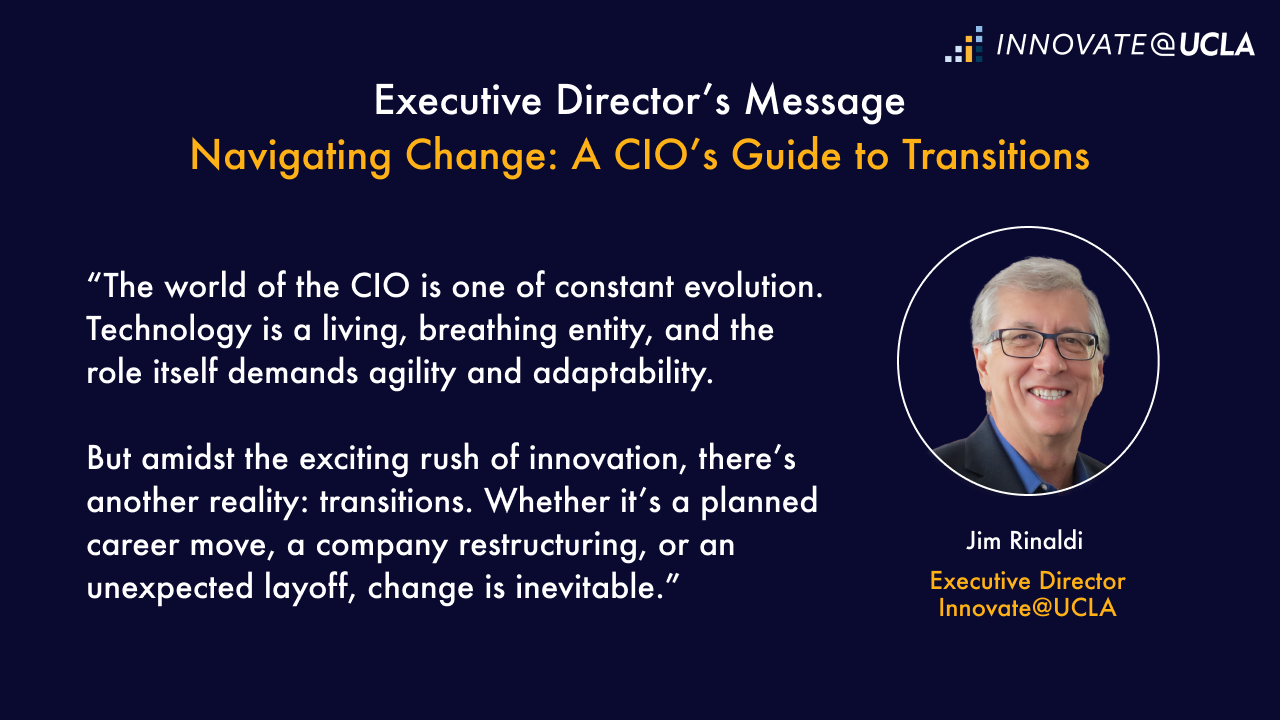The world of the CIO is one of constant evolution. Technology is a living, breathing entity, and the role itself demands agility and adaptability. But amidst the exciting rush of innovation, there’s another reality: transitions. Whether it’s a planned career move, a company restructuring, or an unexpected layoff, change is inevitable.
Recently, Innovate@UCLA provided an event on transitions, with two executive recruiters, and two CIOs on a panel to discuss transitions. Their collective wisdom was a must see event.
As I delve into the emotional rollercoaster of the CIO transition, exploring the various causes – a new job search, a forced departure, retirement, or simply a yearning for fresh challenges. From my experience, I’ll offer insights on navigating this period, from processing the change to landing the next role.
The Many Faces of Transition
- Seeking New Horizons: Sometimes, even the most fulfilling role can become routine. The ambitious CIO might crave a new industry or a leadership position that offers a broader impact. This self-driven transition requires strategizing, networking, and crafting a compelling narrative that showcases past achievements and future potential. Even in my own experience, I really was never in the same industry more than once. I get bored with repeated patterns, even the ones that were great!
- Downsizing and Restructuring: The ever-shifting business landscape can lead to unfortunate realities like layoffs. For CIOs caught in this crossfire, the initial shock can be immense. However, this disruption can be an opportunity to re-evaluate priorities and explore roles in emerging tech sectors like cybersecurity or AI.
- Retirement: After years of leading the digital charge, some CIOs choose to step back. While retirement should be a time of well-deserved rest, the transition can be emotionally complex. Building a strong support network and exploring new ventures, whether entrepreneurial or philanthropic, can ease this adjustment.
- Performance-Related Terminations: Unfortunately, even the most skilled CIOs might face termination. This can be a major blow to confidence. The key here is to learn from the experience, seek honest feedback, and leverage your network for support and potential leads.
Processing the Change: From Grief to Growth
Change, even positive change, can feel like a loss. It’s natural to experience a range of emotions: denial, anger, sadness, and eventually, acceptance. Allowing yourself to grieve the old role is crucial before embracing the new. Here are some tips to navigate this emotional journey:
- Acknowledge Your Feelings: Don’t bottle up emotions. Talk to a trusted friend, mentor, or therapist.
- Forgive yourself: You may feel guilt, anger, or be a victim. As difficult as it is, seek a positive approach. One wise executive once told me, the best revenge is to live a good life!
- Take Care of Yourself: Prioritize your health with exercise, healthy eating, and relaxation techniques.
- Maintain Your Network: Stay connected with former colleagues and industry contacts. Feel free to reach out to colleagues in Innovate@UCLA.
- Focus on Your Accomplishments: Take stock of your achievements and use them to build a compelling resume and interview narrative. Give talks, there are many opportunities.
Finding Your Next Opportunity
Once you’ve processed the change, it’s time to focus on the future.
- Refine Your Skills: The tech landscape is ever-evolving. Being a member of Innovate@UCLA gives you access to leading CIOs, UCLA resources and external experts who provide talks on technology, innovation and change.
- Revisit Your Career Goals: What kind of impact do you want to make? What kind of work environment excites you?
- Target the Right Opportunities: Research companies that align with your values and career aspirations.
- Sharpen Your Interview Skills: Practice makes perfect. Research common CIO interview questions and prepare articulate answers that showcase your expertise and leadership qualities. I was so sure of myself in interviews until I didn’t receive and offer. Then after blaming someone else, I discovered I could have been better in the interview.
- Embrace the Journey: The job search can be a marathon, not a sprint. Stay positive and persistent. I always wanted to learn something new, not replicate what I knew only. IT is a fantastic field that can translate across industries, even financial world.
I have certainly experienced many transitions in my professional life. The perception of retirement scared me and still does. I now seek variety in the things I do. One common theme for me is that I am an IT professional. I have been my whole career. Thanks to my network, starting with Innovate@UCLA members and my external collaborations, I know more about transitions than ever before!
Thanks,
Jim Rinaldi
Executive Director, Innovate@UCLA


